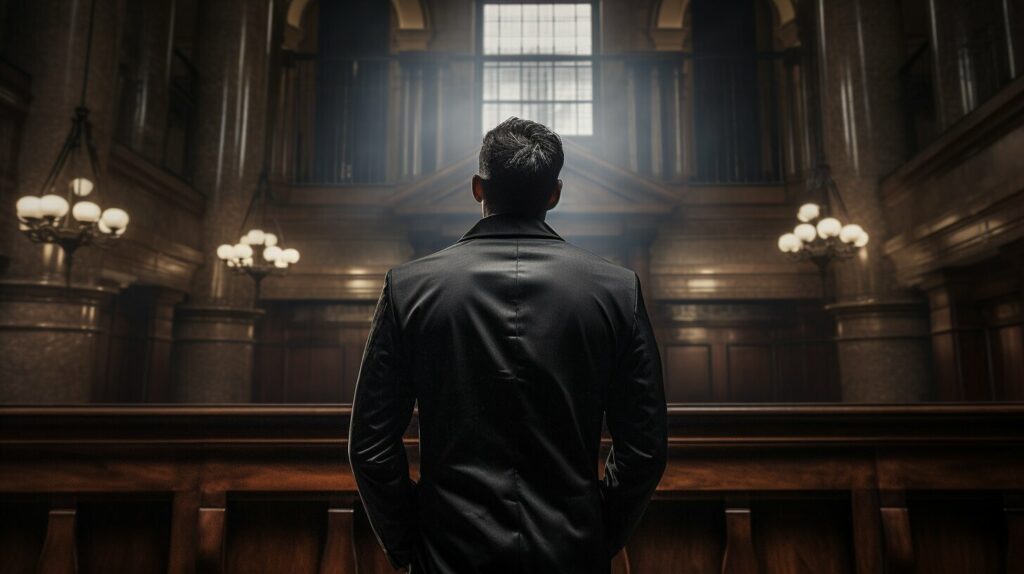Criminal Law FAQs: How Chicago Bail Process Works
Being arrested and facing criminal charges can be a stressful and overwhelming experience. One of the first things you may wonder about is the bail process. How does it work? What are the steps involved? And what happens during each stage?
This article will provide a comprehensive overview of the criminal bail process, from understanding the bail system to finding the right criminal defense lawyer to represent you. By the end, you’ll have a clearer idea of what to expect and how to navigate this process.
Key Takeaways:
- The criminal bail process can be complex and confusing, but it’s important to understand how it works.
- Steps in the process include arrest, booking, bail hearing, and release.
- Posting bail can be done through cash, bond, or property, and requirements vary by jurisdiction.
- Hiring a criminal defense lawyer can provide valuable support and advocacy throughout the process.
- Common challenges include high bail amounts, difficulty finding a qualified lawyer, and strict release conditions.
Understanding the Bail System
When someone is arrested and charged with a crime, they are taken into custody and held in jail until their trial. However, in many cases, individuals are allowed to be released from jail if they provide a sum of money known as bail. This money is used as a guarantee that the accused will appear in court for their trial.
The concept of bail is based on the presumption that individuals are innocent until proven guilty. The ability to post bail allows individuals to continue their lives outside of jail while they wait for their trial, which can take weeks or even months to occur. Bail also helps to alleviate overcrowding in jails, as it allows those who are not a danger to society to be released.
Steps in the Criminal Bail Process
The criminal bail process involves several stages, from the time of arrest to release. Understanding these steps can help you navigate the process more effectively:
| Step | Description |
|---|---|
| Arrest | You are taken into custody by law enforcement officials for alleged criminal activity. |
| Booking | Your personal information, fingerprints, and photographs are taken, and you are entered into the system. |
| Initial Bail Hearing | A judge sets the bail amount based on the severity of the crime and the likelihood that you will appear in court for future hearings. |
| Posting Bail | You can pay the bail amount in full or work with a bail bond company to cover the cost. |
| Release | If you post bail, you will be released from custody while awaiting trial, as long as you comply with certain conditions. |
It’s important to note that the bail process may vary depending on the type of crime you are accused of committing, as well as the state or jurisdiction in which you are located.
What happens during the bail process
Once you’ve been arrested and processed, the bail process begins. Here’s a step-by-step look at what you can expect:
| Step | Description |
|---|---|
| Arrest | This is the first step in the bail process. You will be taken into custody by law enforcement for an alleged crime. |
| Booking | You will be taken to a local jail or booking facility where you will be processed. This may involve taking your picture, fingerprinting, and providing personal information such as your name and address. |
| Setting of Bail | The bail amount may be set based on the severity of the crime and your perceived risk of fleeing. A bail schedule may be followed to determine the amount, or a judge may set a unique amount based on the circumstances of your case. |
| Bonding Out | If you are not able to pay bail outright, a bail bond agent may be contacted to help secure your release. You will need to pay a fee for this service, typically 10-15% of the total bail amount. |
| Bail Review Hearing | If you are unable to post bail, a bail review hearing may be scheduled. At this hearing, a judge will review your case and determine if the bail amount should be lowered or if other conditions can be set to allow for your release. |
| Release | If you are able to post bail or if a judge has set specific conditions for your release, you will be released from custody. You will need to comply with all court orders and may need to report to a probation officer until your case is resolved. |
It’s important to note that the bail process can vary depending on the jurisdiction and the specific circumstances of your case. If you have questions or concerns about the bail process, it’s best to speak with a qualified criminal defense lawyer who can provide you with guidance and advice.

Bail hearing process
Once you are in custody following an arrest, a bail hearing will be scheduled. During this hearing, a judge will review your case and determine whether or not you will be granted bail. If bail is granted, the judge will determine the amount that must be paid in order to secure your release.
It is important to attend your bail hearing with an experienced criminal defense lawyer who can argue on your behalf and present evidence in support of your case. Your lawyer will also be able to guide you through the process and help you understand your legal rights.
During the bail hearing, the judge will consider several factors, including the severity of the crime, your criminal history, and whether or not you are considered a flight risk. If the judge determines that you are a flight risk, they may deny bail or set a higher bail amount as a way to ensure that you will return to court for your trial.
It is important to note that the bail hearing process can be complex and confusing, especially if you are unfamiliar with the criminal justice system. That is why it is essential to have a qualified criminal defense lawyer on your side to help you navigate the process and achieve the best possible outcome.
Posting Bail in Criminal Cases
If you have been arrested, you may have the option to post bail to secure your release until your trial. There are different methods of posting bail, so it’s important to understand the requirements and the potential consequences of each option.
Note: If you cannot afford to pay bail, you may be eligible for a court-appointed attorney who can help you with this process.
| Bail Option | Description | Pros | Cons |
|---|---|---|---|
| Cash Bail | You pay the full amount of the bail in cash upfront | Only requires upfront payment, money is returned after trial | Requires a large sum of cash upfront that may be difficult to come up with |
| Bail Bond | You pay a percentage of bail (usually 10%) to a bail bond company, who then posts bail on your behalf | Requires less upfront payment, may be easier to come up with the 10% rather than the full amount | Bail bond companies often charge fees and require collateral, such as property or assets |
| Property Bond | You use property, such as a house or car, as collateral for the full amount of the bail | You don’t need to come up with cash upfront | If you fail to appear in court, you may lose your property |
| Release on Recognizance (ROR) | You are released on the condition that you promise to appear for all court dates | No costs or fees | Only available in certain cases, such as non-violent offenses and when the defendant has strong ties to the community |
Regardless of which option you choose, it’s important to understand the terms and conditions of your release and to comply with all court orders. Failure to do so can result in the revocation of your bail and your re-arrest.
If you have questions or concerns about posting bail, contact a criminal defense lawyer for guidance and support.
Finding the Right Criminal Defense Lawyer
The criminal bail process can be overwhelming, but having a knowledgeable and experienced Chicago criminal defense lawyer like Josh Adams by your side can make all the difference. Here are some tips for finding the right criminal defense lawyer:
- Look for a lawyer with experience in criminal defense law. This may seem obvious, but it’s important to find a lawyer who has handled cases similar to yours and has a track record of success.
- Check their credentials. A reputable criminal defense lawyer should be licensed to practice law in your state and in good standing with the state bar association.
- Read reviews and testimonials. Look for reviews and testimonials from past clients to get a sense of the lawyer’s communication style, responsiveness, and overall ability to handle cases.
- Ask for referrals. If you have friends or family members who have gone through the criminal justice system, ask if they can recommend a criminal defense lawyer they trust.
Keep in mind that the criminal bail process moves quickly, so it’s important to find a criminal defense lawyer who can act swiftly to protect your rights and defend your case.
Remember, finding the right criminal defense lawyer can greatly increase your chances of a successful outcome during the bail process.

Benefits of hiring a criminal defense lawyer
If you have been arrested and are facing criminal charges, it is essential to have an experienced criminal defense lawyer on your side. Here are some of the benefits of hiring a criminal defense lawyer:
- Knowledge and experience: A criminal defense lawyer has the knowledge and experience to navigate the complex legal system and provide you with the best possible defense. They know the law inside and out and can use this knowledge to your advantage.
- Protect your rights: A criminal defense lawyer will ensure that your rights are protected throughout the bail process and any subsequent legal proceedings. They will also ensure that any evidence against you is obtained legally and is admissible in court.
- Plea bargaining: A criminal defense lawyer can negotiate with the prosecution to get your charges reduced or dismissed. They can also negotiate a plea bargain that may result in a lighter sentence.
- Emotional support: Going through the criminal justice system can be stressful and overwhelming. A criminal defense lawyer can provide you with emotional support and help you through this difficult time.
Choose the right criminal defense lawyer for your case
When choosing a criminal defense lawyer, it’s important to look for someone who has experience in handling cases similar to yours. You also want someone who is responsive and communicates well with you. Additionally, look for a lawyer who offers a free consultation so you can discuss your case and determine if they are the right fit for you.
Josh Adams, a reputable criminal defense lawyer in Chicago, has years of experience handling a wide variety of criminal cases. He offers a free case consultation and will work tirelessly to provide you with the best possible defense. Contact him today to schedule your consultation.
Common Challenges and Pitfalls
While the criminal bail process can be complicated, there are some common challenges that many people encounter. Here are some of the pitfalls to watch out for:
- High bail amounts: Bail amounts can be prohibitively high, making it difficult for people to come up with the money required for release.
- Difficulties in posting bail: Even if you have the required funds for bail, the process of actually posting bail can be complicated. This is especially true if you don’t have access to a credit card or bank account.
- Lengthy wait times: The bail process can take time, and there may be waiting periods between different stages. This can be frustrating for those who want to be released as soon as possible.
- Judicial bias: Unfortunately, there is a risk of bias against certain individuals during the bail process. This can include discrimination based on race, gender, or economic status.
- Violating bail conditions: Once you have been released on bail, it is important to comply with all conditions set by the court. Violating these conditions can result in legal consequences and could jeopardize your case.
By understanding these common challenges and pitfalls, you can take steps to avoid them and make the bail process as smooth as possible.

Other Frequently asked questions about the criminal bail process
When you or someone you know is facing criminal charges, understanding the bail process can be overwhelming. Here are some frequently asked questions and their answers to help give you a better idea of what to expect:
What is bail?
Bail is a monetary payment or other form of collateral given to the court to allow a person accused of a crime to be released from jail before their trial. It serves as an assurance the accused will return to court for their trial.
Who sets the bail amount?
The bail amount is set by a judge during a bail hearing. The judge takes into account various factors, including the nature of the crime, the defendant’s criminal record, and their ties to the community, to determine an appropriate amount.
What happens if you can’t afford bail?
If you can’t afford to pay the bail amount, you can work with a bail bondsman who will post the bail on your behalf for a fee, usually about 10% of the total bail amount. They will also require collateral, such as property or a vehicle. If the defendant fails to appear in court, the bail bondsman is responsible for paying the full bail amount to the court.
Can the bail amount be changed?
Yes, the bail amount can be changed. If new information arises that affects the defendant’s flight risk or danger to the community, the prosecution or defense can request a bail hearing to modify the bail amount.
What happens if the defendant fails to appear in court?
If the defendant fails to appear in court, a warrant is issued for their arrest and they forfeit their bail. The bail bondsman also has the right to hire a bounty hunter to track down the defendant and bring them to court.
Can the bail money be refunded?
Yes, if the defendant appears in court as scheduled, the bail money is refunded at the end of the trial. However, the court may withhold a portion of the bail as payment for any fines or fees owed.
Can the defendant leave the state while out on bail?
Usually, a defendant must remain in the state while out on bail. However, if they need to leave the state for a valid reason, such as a family emergency or for work, they must get permission from the court and their bail bondsman before leaving.
Remember, the bail process can be complex and overwhelming. If you or someone you know is facing criminal charges, it’s important to consult with a skilled criminal defense lawyer who can guide you through the process and advocate for your rights.
Contact a Chicago criminal defense lawyer for a free case consultation
If you or a loved one has been arrested, it’s crucial to seek the assistance of a skilled criminal defense lawyer who can guide you through the complex bail process and protect your rights. For a free case consultation with Josh Adams, a seasoned criminal defense lawyer in Chicago, call us today at 312-566-9173 or fill out our contact form.
With years of experience defending clients in criminal cases, Josh Adams has the knowledge and expertise to help you navigate the bail process and fight for the best possible outcome in your case. He understands the stress and uncertainty that come with a criminal arrest, and will work tirelessly to ensure your rights are protected every step of the way.
During your free consultation, Josh will review the details of your case, answer any questions you may have, and provide you with an honest assessment of your options.
He will remain by your side throughout the bail process and beyond, providing you with the support and guidance you need to achieve the best possible outcome in your case. The firm handles all kinds of criminal law cases in Illinois including Chicago drug possession and drug trafficking law cases in Chicago, theft and Chicago burglary cases, gun and weapons charges, white collar crimes in Chicago, and other serious crime cases.
Don’t wait to get the legal help you need. Contact Josh Adams today to schedule your free case consultation and take the first step towards protecting your rights and your future.


